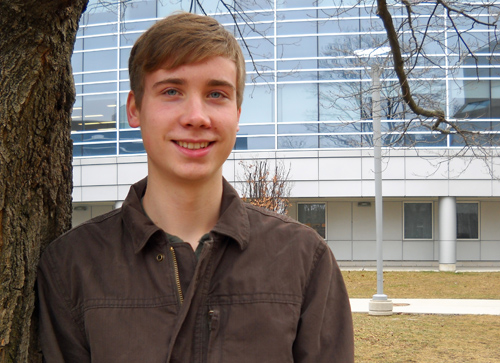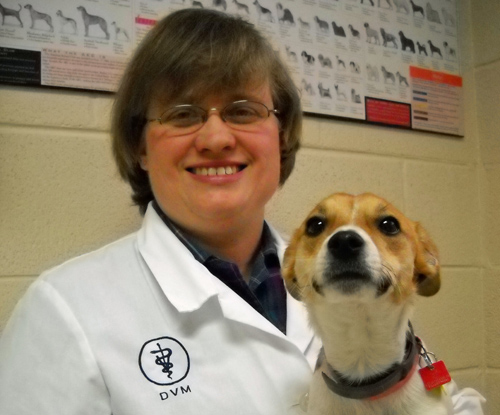
For John and Michelle Cline, the critical moment happened sometime in the mid-1980s, when they met as students at the University of Guelph. But they enjoyed another moment – poignant in a different way – when they returned to U of G last summer with their eldest son, Andrew.
The family planned to tour the campus before Andrew began biology studies in the fall. Walking from the parking lot, Michelle noticed that her son appeared pensive. Finally his thoughts came out: “So grandpa and grandma went here, and aunt Peggy and uncle Paul, and dad and you…”
Her reply? “We’re standing in a long tradition here.”
Recalling the exchange one morning last month, she smiles across the kitchen table of The Evergreens, the family’s 1820 stone house in Grimsby, Ont. “It was the moment he put it all together. It was a nice moment.”
Plenty of families boast wide-ranging connections to Guelph, with numerous members and generations having studied or worked here. Count the Clines among them.
With alumni from all three of the University’s founding colleges – including one current professor – and with the third generation now embodied in Andrew, the Cline family might view U of G as their school of choice.
Not that there was any plan, says Robert Cline, the family patriarch and a 1956 graduate of the Ontario Agricultural College (OAC): “We just sort of grew into it.”
John and Michelle met here during the 1980s. They were in different programs – he studied soil sciences for a B.Sc.(Agr.) in 1987 and she finished her DVM a year later – but they met on campus somehow. “Probably at the library,” says John.
Today he’s a plant agriculture professor studying tree fruits at U of G’s Simcoe Research Station near Lake Erie, about a 90-minute commute mostly through southern Ontario countryside.
Simcoe was connected with a sister station in Vineland, just a 15 minutes’ drive from home along the Queen Elizabeth Way. At both stations, researchers have long studied horticultural practices, developed cultivars and supported farmers in the Niagara fruit belt and on the Norfolk sand plain.
One of those researchers was John’s father, Robert, who spent 37 years at Vineland studying nutrition, fertilization and irrigation of tree fruits, grapes and vegetables.
Robert had begun working at the station as a Guelph chemistry student in 1953. He’d grown up in nearby St. Catharines and helped his grandfather occasionally on a Niagara-area farm.
Retired in 1992 and now living in Owen Sound, Robert had also met his wife, Barbara, Mac ’56, at Guelph. Speaking over the phone last month, Robert recalls living in Johnston and Mills halls.

“We developed a great year spirit,” says Robert. He and Barbara last visited Guelph in 2006 to mark their classes’ respective half-centuries.
Barbara died in early 2011. Her brother, Bruce Marshall, and his wife, Donna, also attended OAC and Macdonald Institute, respectively, during the 1960s; they now live in Woodstock.
In 1992, the elder Clines moved to Owen Sound to start an orchard on an 88-acre spread they’d bought a decade earlier. There the couple also ran a country market store called Sound View Orchards, where Barbara, a nutritionist, sold apples and baked goods. Robert still owns the farm, where he grows about 25 acres’ worth of apples.
In turn, their grandparents’ farm became a favourite destination for a young Andrew and his brothers, Peter and Philip. The boys drove a golf cart through the orchard, helped their grandparents pick fruit, visited their market store and swam in nearby Georgian Bay.
Robert recalls a phone call last year from his grandson. “I remember him calling me to say he was going to Guelph. I was very pleased. It was nice to see that he was carrying on.”
For Robert, the conversation carried echoes of another chat he’d had decades earlier with John. Besides attending OAC – by then one of the colleges of U of G – John later followed his father’s path to grad studies at Michigan State University.
He and Michelle were married by then. While he studied horticulture, she worked in a mixed animal practice. They took their ag-vet tandem to Kent, England, where John completed his PhD in 1994 at the East Malling Research Station affiliated with the University of London.
Back in Canada, things fell into place at home and at work.
Robert and Barbara had just moved to Georgian Bay, leaving the family home in Grimsby vacant. For John, coming home would have layered meanings.
He’d grown up in The Evergreens, a stone farmhouse that had already accumulated a century and a half of history before his parents bought it in Canada’s centennial year.
The house was built in 1820 by a member of the Pettit family, descendants of United Empire Loyalists who worked a 160-acre farm spanning the Peninsula between the Niagara Escarpment and Lake Ontario. The property remained in that family for about a century, according to an old ownership deed that the Clines found in the house. Says Michelle: “We tap maple trees planted by the Pettits.”
Today that house with its Georgian touches is easy to miss, tucked in the middle of a decade-old subdivision.
But growing up, the Cline kids – John, his twin brother, Paul, their older brother, David, and sister, Kathryn – still had acres’ worth of open space to run in. “We grew up with fruit farms around us,” says John. Sometimes they went with their dad to the Vineland station, where they picked fruit and wandered the fields and buildings between Lake Ontario and the QEW.
Robert never pushed his kids to follow his own path, although one bit of advice did stick with John: “Father said there should always be jobs in agriculture, people always need to eat.”
That message must have resonated indirectly with Paul, too.
He studied microbiology at Guelph and graduated in 1987; now at the Ontario Ministry of the Environment in St. Catharines, he works with farmers on nutrient management regulations. Paul’s wife, Peggy, took consumer studies at Guelph, graduated in 1988 and works at her local library. (Breaking with family tradition, Paul and Peggy met not at U of G but in Owen Sound. Kathryn studied nursing at the University of Western Ontario and now lives in Owen Sound; David lives in Simcoe.)
Settling into the new-old family home in Grimsby after their return from England, Michelle worked at several practices in Hamilton. In 1999, she moved to the Grimsby Animal Hospital, where she is now an associate working with three Guelph grads: Bill David, DVM ’78, Suzi Peters, DVM ’94, and Dalia Gough, DVM ’02. Michelle had settled on veterinary studies early in life, having grown up on a hobby farm in London, Ont.

John found himself not only living in his childhood home but also later working at the Vineland research station where his dad had spent his entire career. He even occupied his father’s old office and lab there. In 2002, he began dividing his time between Vineland and Simcoe.
In 1997, those stations and a third one in the Holland Marsh near Toronto – all part of the Horticultural Research Institute of Ontario – were transferred from the provincial government to U of G’s Department of Plant Agriculture. That change turned John from a government research scientist into a U of G researcher and teacher.
Today he spends most of his time in Simcoe, where he supervises graduate students in plant agriculture. He also teaches horticultural courses in Guelph.
Coming to the U of G campus now gives him a chance to catch up with Andrew.
After his first semester, Andrew switched from general biology to agriculture. Although he hasn’t decided on his career path yet, the Guelph student plans to pursue horticulture. “Seeing what my dad does makes me interested.”
Riding in a Gator vehicle around the Simcoe campus seems to have made more of a lasting impression on him than visits to the veterinary clinic. Or at least a better impression: he went to work one day with his mom, but says that was enough: “I don’t think I could do surgeries.”
His brothers have also helped dad with his research. But middle son Peter also helps mom at the clinic down the road from home. Another OVC candidate in the making? Who knows, says Michelle.
Until then, Andrew is the family’s U of G baton-carrier. “Generations of the Clines have been here,” he says. “I feel like I’m fulfilling something, living up to the goal, something like that.”